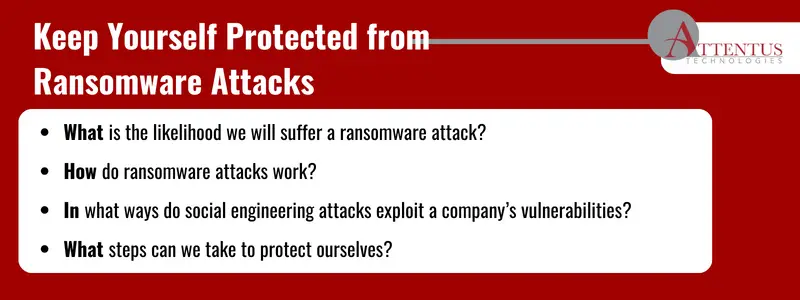It’s not a matter of if you will suffer a ransomware attack but when. Here are steps you can take to protect your organization

While ransomware attacks have been with us for a long time, their threat is increasing. Statistics show that they affected 66% of organizations in 2023 and that ransomware attacks were responsible for 24% of all data breaches, costing victims millions of dollars and tarnishing their brands.
For example, in early 2023, the British Royal Mail service suffered a ransomware attack by the LockBit ransomware group, which made an $80 million ransom demand.
Social engineering lies at the heart of many ransomware attacks. Everyone with a computer should know how to recognize and avoid these attacks. It’s sobering to think that small steps such as employee training, enabling a DNS filter, or regular network monitoring could have stopped organizations from suffering major ransomware attacks.
Here is what you need to know to protect your company from ransomware attacks.
What is a ransomware attack?
According to IBM, “Ransomware is a type of malware that holds a victim’s data or device hostage, threatening to keep it locked—or worse—unless the victim pays a ransom to the attacker.”
In the early days of this threat, only one ransom might be demanded. But now, one ransom attack can incur two or three more threats. The attacker could threaten to release a targeted victim’s sensitive data online. The bad actor could also use the stolen data to attack the victim’s customers or business partners.
There are two main types of ransomware. The most common is encrypting ransomware or crypto-ransomware, in which a victim’s data is held hostage by encrypting it. A ransom is demanded for the encryption key. The second type is locking ransomware, in which an entire device is locked by blocking access to the operating system. Instead of a startup screen, you get a ransomware demand.
What is social engineering?
Like malware, social engineering exploits network vulnerabilities to pose significant threats to organizations. It is the art of manipulating, influencing, or deceiving individuals to gain control of their computer system.
The hacker can use a large variety of tactics in the execution of this kind of attack, such as:
- Email phishing—scams trick users into providing sensitive credentials or carrying out sensitive tasks such as transferring money or downloading an application
- Smishing—an SMS version of phishing
- Spear phishing—uses urgency and your personal information to get you to click a link
- Vishing—a type of social engineering attack that happens over the phone
- CEO fraud—targets businesses that regularly make wire transfer payments with foreign suppliers
A social engineering attacker could, for example, pose as Microsoft or your I.T. company and ask for your help in implementing a patch or fixing a virus on your system. However, their “fix” will contain the problem and compromise your system. These kinds of scams are becoming more prevalent as hackers try to prey on people working remotely.
Social engineering works by manipulation, while ransomware works with malware (software designed to disrupt, damage, or gain unauthorized access to your computer system). Sometimes, the two can work together. An attacker might lock a device and then prevent the victim from removing the ransomware from their device by using a social engineering tactic. They might pose as law enforcement or other government authorities, issuing a penalty or fine for supposed illegal online activities.
How to avoid ransomware and social engineering attacks
To save yourself grief and money, you need to know how to protect yourself from ransomware and social engineering attacks. Part of managing your network security threats should include:
1. Educating your team
One of the most effective ways to boost security is to teach your employees how to spot phishing attempts and the tactics attackers use to access your systems. We also recommend following training with regular test phishing attempts to ensure that employees can spot the attack and that the training has succeeded.
2. Utilizing tools to thwart social engineering and ransomware attacks
It’s very likely not a matter of if but when you will suffer a cyberattack. So, the necessary tools should be set up to prevent social engineering and ransomware incursions. These should include DNS email filters, flagging emails from outside your organization, and setting up your email inbox to display the email address instead of the sender’s name. These precautions can help your employees easily identify potential phishing emails or block most of them from reaching their inbox.
3. Setting up clearly defined policies to help tighten general I.T. security.
To keep your business safe, you should enact policies that reduce the likelihood of successful attacks. Great first steps include implementing strict policy guidelines about any form of money transfer or payment system, utilizing user-based permissions so not everyone has full access to your data, and requiring multifactor authentication and regular password updates.
4. Maintaining backups
One of the best ways to recover from a ransomware attack is to back up your most important data. However, your backup must be appropriately protected and perhaps stored offline so it can’t be compromised as well.
5. Keeping your systems up to date
Ensure your company’s operating systems, applications, and software, including security patches, are regularly updated. This can narrow or close the security gaps cybercriminals hope to exploit.
Let Attentus help you stay safe
If you want peace of mind and a high degree of safety for your organization, choose a managed services provider (MSP) with a track record of reliability and excellence. As the Seattle area’s leading provider of I.T. services, Attentus Technologies can manage your I.T. infrastructure effectively with the latest security tools so you can concentrate on what’s important—managing and growing your business.
Contact us today for an accurate price quote in 30 minutes and to learn more about what we can do for you.
